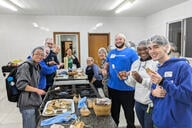You have /5 articles left.
Sign up for a free account or log in.
Administrators and faculty members at Clemson University today will live a day in the life of a person with a disability, but some professors say the event -- meant to raise awareness and shape future policy decisions -- reinforces stereotypes and pity toward people with disabilities.
The event, called Walk & Roll in My Shoes, pairs able-bodied administrators and faculty members with students with various disabilities. The administrator spends half a day living with their student partner's disability -- the student offering advice and strategies along the way -- before the pairs meet for a luncheon to discuss their experiences.
But the act of simulating a disability -- and the fact that students participating in the event are referred to as “shadows” because of their background role -- has some faculty members calling for the university to cancel what they see as an offensive masquerade.
“I think that a simulation event of any kind -- whether it’s try on poverty for a day, or try on race for a day, or try on a queer identity for a day -- raises problems,” said Jillian Weise, an assistant professor of English. “It assumes that a nondisabled participant can understand disabilities totally and completely by wearing goggles or by wearing headphones.”
Weise, who walks with a prosthetic leg, said the event negates the personal experiences of living with a disability, instead promoting a superficial understanding of disabilities through a kind of parody. Relegating students with disabilities to the role of “shadows” will also fail to raise awareness, Weise said.
“We need to be more visible, and ‘shadow’ implies a nonperson, a nonentity, and the word ‘shadow’ is related on a literary basis to ghost, to death,” Weise said. “At this moment, we need to see persons with disabilities being successful and in positions of power.”
Weise, along with fellow English professors William Stockton and Catherine Paul, brought their concerns to Clemson's office of student disability services last fall. But despite the professors’ concerns, the event is still scheduled for Thursday -- largely because the response from participating students and administrators has been overwhelmingly positive.
“We haven’t heard any complaints from the participants. We haven’t heard any complaints from students that are involved,” said Arlene Stewart, director of student disability services. She said the goal of the event is to put students with disabilities in contact with influential policy makers on campus.
Dan Hofmann, Clemson’s director of parking and transportation, said participating last year was an “eye-opening event” that has given him a new perspective on how to make the campus more accessible to people with disabilities. During the event, he wore a walking boot and had to navigate campus on a motorized scooter.
“You take for granted what a lot of people go through,” Hofmann said. “Even though things are supposed to be on an equal plane, they’re not.”
While the event is inspiring some administrators to change how they think about people with disabilities, Stockton said the experience portrays the issue in the wrong light.
“Even if policy changes do result from this event, there is also a high risk that the event encourages abled people to pity those with disabilities,” Stockton said. He added that simulating a disability for a single day could trivialize the experience and make administrators act out of pity.
Stewart said the response from students matches that of the administrators. This year, a Clemson alumnus currently living in California -- and a two-time participant in the Walk & Roll event -- attempted to fly back to Clemson to participate, she said.
“The students tell us they are so excited to interact with policy development folks,” Stewart said, adding that her office is open to suggestions on how to improve the event in the future.
Apart from the debate over Walk & Roll in My Shoes, the professors generally praised the student disability services office for the otherwise “fantastic” programming it offers Clemson’s students. Later this week, the university will screen the documentary "See What I'm Saying: The Deaf Entertainers Documentary," which Weise said represents a type of event that could help erode stereotypes about people with disabilities.
The three professors said the university could increase awareness of people with disabilities not only by incorporating them into cultural and sports events, but by expanding disability studies into stand-alone courses and even, Paul suggested, a minor.
“Clemson could really benefit from some of the perspective that has come from that field,” Paul said. “I have the sense that Clemson is at a crossroads with respect to disability, and I believe there are real opportunities right now for good things to happen -- updating and clarification of policies, enhancement of curriculum, conversations across disciplines, and new interactions between students and faculty.”




